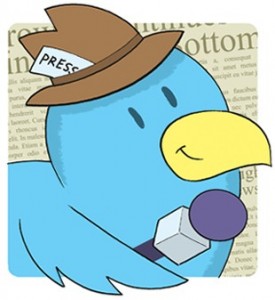The Twitter Journalism Debate
 Twitter has polarised the media industry. On one end you have those who believe Twitter represents the new wave of journalism because it panders to the now-generation. On the other end are those that think Twitter is a resource that can aid journalism but that it will never replace proper investigative reporting.
Twitter has polarised the media industry. On one end you have those who believe Twitter represents the new wave of journalism because it panders to the now-generation. On the other end are those that think Twitter is a resource that can aid journalism but that it will never replace proper investigative reporting.
In a debate with Brian Solis, Michael De Monte argues the latter. He says that while Twitter allows you to provide 140 character sound bites, it does not allow you to provide any deeper insights, and insights are what journalism is all about. Facts need to be reported, yes, but context and reflection are vital.
Take tweeting live events for instance. Have you ever followed a live event on Twitter? It verges on painful. Inane updates about conference speakers walking to the podium and cracking lame jokes (the gist of which we are not told) overshadow actual content. And any content that is provided is meaningless because the tweeter is so busy live tweeting that he or she isn’t paying enough attention to the meaning behind the words.
As De Monte says, Twitter is a tool that limits expression.
So, what is it good for?
Well, it’s very good for sound bites.
If you do have breaking news Twitter is a brilliant way to announce it. If you’ve already published a story online, Twitter is a brilliant way to link to it. And if you want to solicit comments and public opinion then Twitter is brilliant for that too.
Twitter is also a good way to find breaking stories, although this shouldn’t be a journalist’s first resource. As a source of breaking news its best suited to those who consume news rather than those who create it. But if journalists want find out more about their competition then following their peers on a Twitter is good place to start.
What else is it good for?
In April 2008, Read Write Web ran a story about how it used Twitter as journalistic tool. Staff writers use Twitter in a number of ways, one of which is to conduct interviews. As an interview tool, Twitter works in two ways:
- Writers can ask their followers for question suggestions (and also punt the upcoming article).
- Writers can conduct the actual interview on Twitter either with interaction from followers in the public domain or via direct messages. This is helpful when interviewees are on the move but are still connected to the world at large thanks to smart phones, laptops or tablet devices.
Make no mistake, the debate is by no means over; especially as Twitter continues to be used for hoaxes and pranks. But, its immediacy, reach and convenience are not to be under-estimated.
The future of journalism is set to be interesting.
Sandy writes for a number of different blogs, on a number of different topics, including PR communications, advertising, travel, technology and the environment.
Posted in Social Networking. Tags: social media ethics, twitter
No Replies
Feel free to leave a reply using the form below!

